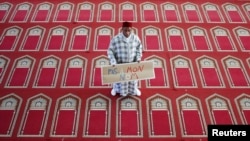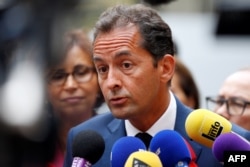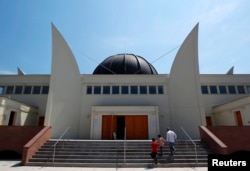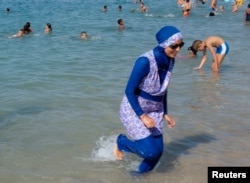French Muslims are broadly comfortable with their nation’s secular crede, but a significant minority have deeply conservative and sometimes hostile views about the French state and society, with more than one-quarter believing Islam’s Sharia law supersedes state laws, according to a new study by the Paris-based Montaigne Institute.
The survey by polling agency IFOP, whose main findings were published Sunday in France’s Journal du Dimanche weekly, paints a fractured portrait of the country’s largely young, Muslim community, in the crosshairs of searing debates over the veil and body-covering burkini, not to mention the series of terrorist attacks that have hit the country since January 2015.
“There is no single Muslim community. There are Muslims who are very different and who are increasingly different,” says report author Hakim El Karoui. He describes the study as a “wake-up call” for action on the part of Muslims and the state to build a healthier relationship with France's second largest religion.
The institute estimates France’s Muslim population, the largest in western Europe and equally divided between native and foreign born, at under four million, significantly smaller than previous estimates of about five million or more.
France forbids collecting official statistics on race, ethnicity or religious affiliation, making it difficult to assess exact numbers.
Religious not national identity
Polling more than 1,000 Muslims out of a sample population of more than 15,000, it also finds the majority of French Muslims are under 50 and keep a low profile both politically and socially. Only a tiny minority participate in Muslim associations, and only about one-third vote.
While most consider religion important, less than one-third go to the mosque on a weekly basis. But Islam penetrates their views and habits. Seven in 10 say they eat Halal, and a strong majority support women’s right to wear the veil, although they are against the wearing of the face-covering niqab or burka, a political flashpoint.
Perhaps the most troubling findings surround those who hold more extremist views, about 28 percent of the Muslim population, according to the Montaigne survey. Most are young, poorly educated and hail from the country’s neglected suburbs and other working-class areas.
“They are in revolt. They could have been punk rockers in another era,” El Karoui says. “They feel rejected by society and they can’t identify with their countries of origin, so they use Islam as their identity.”
Only a small fraction of this group include the extremists who have launched terror attacks in France, he says. Yet many use Islam as a rallying point, even if they remain deeply ignorant of the religion and its dictates.
“I think we need to quickly transform this situation, which is unacceptable,” El Karoui adds. “We can’t let a part of French society use religion as a means of rebellion. It’s not the role of religion and it’s very dangerous.”
The study comes amid sharp debates over Islam in public life, waged over summer bans of the body covering burkini on some beaches, but also over matters like the veil and face-covering niqab, halal slaughtering practices, and same-sex public swimming pools.
Possible change
A business executive and former political speechwriter, El Karoui helped launch a petition in July with several dozen prominent French Muslims calling for a reorganization of France’s Islamic community, which is deeply divided along ethnic lines, with leaders supported by different North African countries and Turkey carving out their own spheres of influence.
The French state has long campaigned a a French Islam, free from foreign influence and embracing the country’s secular principles.
Yet a newly formed Foundation for Islam in France, aimed to improve relations between the state and the Muslim community and to finance mosques, is deeply controversial, as is the appointment of non-Muslim French politician, Jean-Pierre Chevenement, to head it.
The Montaigne study outlines its own ideas for shaping a French Islam, including more unusual ones, such as teaching Arabic in public schools and rethinking France’s foreign policy to stem Wahabi influences from Saudi Arabia and Qatar.
Strikingly it calls on France's Muslim community to get more involved politically and socially.
"The message is they have to engage," El Karoui says, "to show that Islam isn't what the fundamentalists make it out to be."



